American Brittany Breed Profile: Brittany Spaniel Dog Breed
The Brittany is a versatile hunting dog known for its ability to point and retrieve game. Originating from the French region with the same name, this breed combines agility, speed, and endurance with an excellent nose for scent tracking.
Standing 17.5 to 20.5 inches at the shoulder, American Brittanys have a solid yet compact stature. Their dense coat, similar to the Welsh Springer Spaniel’s, can be either flat or wavy, often in shades of orange and white or liver and white.
These dogs, much like the eager-to-please Welsh Springer Spaniel, are intelligent and willing to learn, making them relatively easy to train with a consistent and positive approach. Like the Welsh Springer, their friendly and adaptable nature makes American Brittany great family pets and the best dogs for participating in dog sports.
Their friendly nature and ability to adapt to various environments make them well-suited for life both in the field and at home.
Key Takeaways
- Brittanys excel in hunting with a keen sense of smell.
- Compact and agile, Brittanys have a robust build and varied coat colors.
- They’re intelligent, trainable, and thrive as active family companions.
The Brittany is a gifted hunting breed from France. These medium-sized dogs boast a sturdy frame and a coat of orange or liver hues. Their intelligence and sociability make them both excellent hunters and loving pets.
Quick Facts
Originating from the Brittany region of France, Brittany spaniels stand out for their moderate stature, typically measuring between 17.5 and 20.5 inches and weighing 30 to 40 pounds. They have a respectable lifespan, often reaching 12 to 14 years.
As part of the Sporting Group, these dogs are valued for their energy and adaptability, inherited from their hunting background. They are quick, attentive, friendly, and keen to please, making them a breeze to train.
However, they need plenty of exercise to constructively manage their high energy levels. Their size and sturdy build make them perfect for individuals or families who lead an active lifestyle.
Brittany Dog Pictures
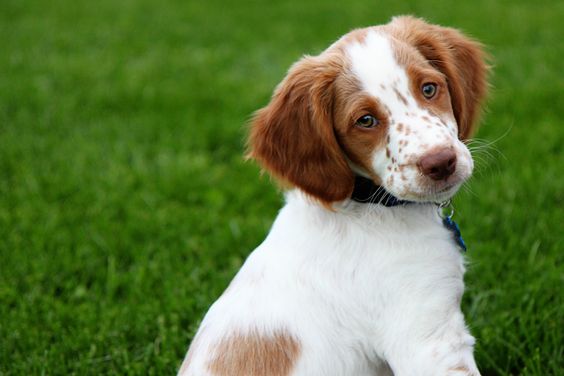
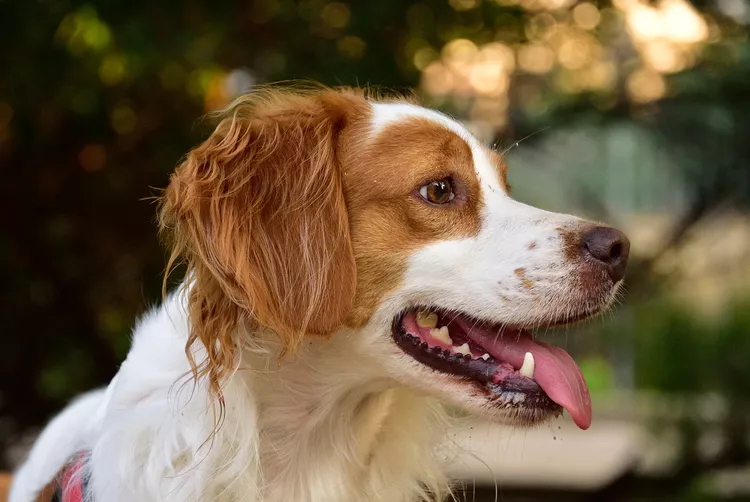


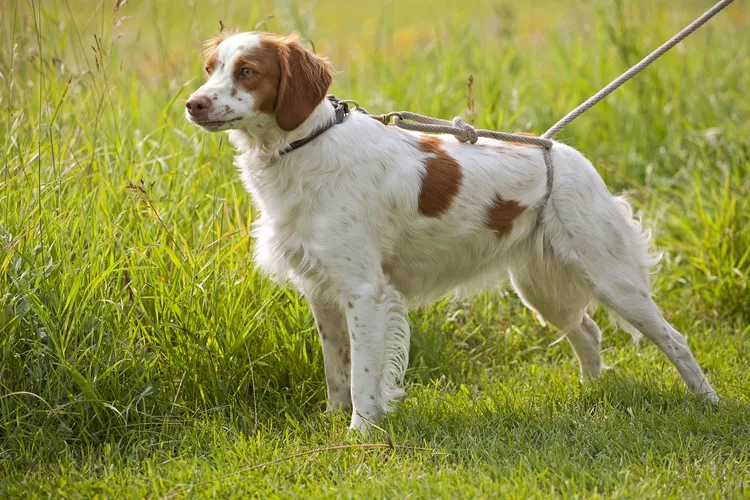

Overview
The Brittany is a sporting breed known for its agility, keen intelligence, and friendly demeanor. Recognized by the American Kennel Club, these dogs have a robust and agile physique developed for stamina and quickness. Their coats are dense, flat, or wavy, displaying striking white, orange, or violet colors, which look good and protect them during outdoor adventures.
Brittanys need daily physical activity to stay healthy and happy, as they have a lot of energy to burn. They are most comfortable in an environment that provides consistent training and a loving family.
The proper training and companionship are critical to Brittany’s happiness. Their eagerness to please and learning capacity make them a joy to train.
Key Traits
Brittany Spaniels are known not just for their athletic build and striking looks but also for their sharp minds and calm nature. These characteristics are vital for a breed that excels as a loving pet and a diligent working dog. Brittanys possess a zest for life that makes them perfect for owners who lead active lives and can offer plenty of daily activities and mental stimulation.
Their quick-wittedness and desire to please make them a dream to train, so they are favorites among those involved in hunting and canine sports.
| Trait | Description | Relevance |
|---|---|---|
| Intelligence | Quick at learning new tasks and adapting | It makes for a great family pet |
| Temperament | Affectionate and even-tempered with families | Makes for a great family pet |
| Energy Level | Vibrant, needs a lot of exercise every day | Ideal for energetic owners, crucial for work in the fields |
The Brittany’s range of innate abilities makes it a multi-talented breed, adept in both work settings and as a faithful friend.
Dog Breed Origins
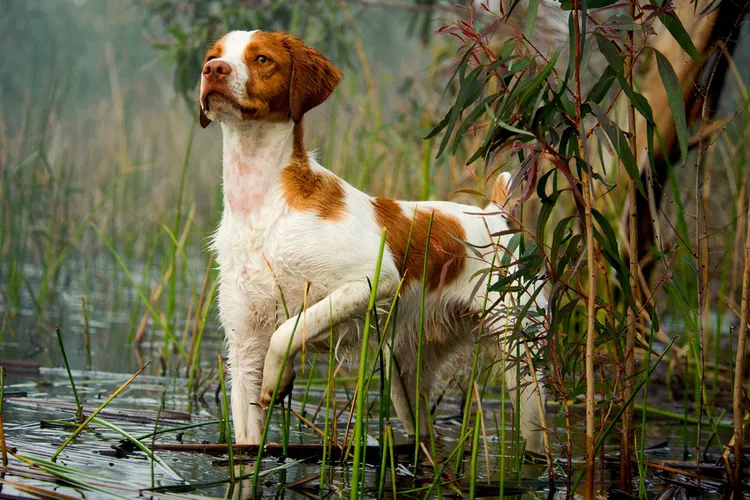
The Brittany dog breed has deep roots in the French countryside, boasting a history intertwined with its role in assisting hunters. The breed’s agility and attentiveness were honed through generations working closely with humans in hunting roles. The environment of its origin in France greatly influenced Brittany’s physical build and temperament.
Over time, Brittany has adapted from a focused hunter’s assistant to a loyal family pet. This shift reflects broader changes in how people hunt and their evolving relationship with dogs. The breed’s journey from the fields of France to becoming a cherished household member showcases its versatility and enduring appeal.
Ancestral Hunting Roles
The Brittany dog breed became a favorite among hunters for its keen hunting skills, thanks to careful breeding in France during the 1800s.
Breeders in the Brittany region crossed local Spaniels with English Setters to create a breed that excelled at pointing and retrieving game, essential skills for gun dogs.
These dogs quickly proved their worth in the hunting world, impressing with their ability to find the game and fetch it after being shot.
The Brittany’s strong hunting instincts, passed down through generations, still make them reliable partners in fieldwork today.
Geographic Origin Influence
The Brittany dog breed hails from the coastal region of Brittany, France, where the rugged terrain and variable weather shaped its physical and behavioral attributes. Due to the area’s dense underbrush and diverse landscapes, these dogs needed to be agile and sturdy. They developed into a medium-sized breed that could handle rugged terrains and often wet conditions.
Their historical evolution in Brittany gave them an outstanding sense of smell and the endurance necessary for hunting and retrieving game across their multifaceted homeland. These traits remain the hallmark of the Brittany breed today, making them excellent hunting companions.
History of the Brittany
The Brittany dog has a rich history that spans across centuries. Through the crossbreeding of local Spaniels with English settlers, the region of Brittany in France gave rise to a highly skilled and adaptable breed. Initially, these dogs were bred for their prowess in hunting, able to point and retrieve game in the challenging landscapes they originated from. Selective breeding focused on traits that would improve their effectiveness in the field.
Physical Dimensions
Brittany Dogs have a versatile build, contributing to their performance as affectionate companions and skilled hunters. Their height usually falls between 17.5 and 20.5 inches, which is suitable for efficiently traversing different types of landscapes. They generally weigh between 30 and 40 pounds, balancing agility and durability.
Brittany’s body is compact and athletic, a design that serves them well in the field or at home.
Average Height Range
Brittany dogs have a height range of about 17.5 to 20.5 inches at the shoulder, which makes them highly adaptable for various physical tasks. They are medium-sized dogs with a solid and elegant body, ideal for speed and agility.
This size allows them to move through thick underbrush while still being visible during field activities. The careful attention to maintaining their size shows the attentive breeding practices that ensure Brittanys are ideally suited for their roles.
Typical Weight Span
Brittany dogs have a weight range of 30 to 40 pounds, which is ideal for their size and active lifestyle. These dogs are muscular and quick, traits that have historically made them excellent hunting companions.
Maintaining weight is critical for their looks and health, as being too heavy or light can lead to health problems like joint issues or metabolic conditions.
American Brittanys often weigh heavier, while their French counterparts might be lighter. Good breeding practices and the proper diet are vital to keep them in peak condition, ready to show off their energy and stamina.
Body Shape Characteristics
Brittany dogs have a well-proportioned and medium-sized body, ideally suited for their lively hunting lifestyle. Bred for roles like pointing and setting, they have a physical structure that supports a wide range of hunting activities. Their solid yet nimble build allows them to move with a smooth and expansive gait, ideal for quickly traversing different types of ground. Some Brittanys are born with shorter tails, a variation that reflects the breed’s genetic diversity, but this feature doesn’t affect their performance in the field.
Careful breeding is essential to avoid typical bone and joint problems such as hip dysplasia, which is especially relevant to their size and health. Maintaining the delicate balance between their build and ability to function is critical to their success as hunting partners.
Coat Length Variation
Brittany dogs have coats of medium length, which helps them move through different hunting terrains quickly. Their fur acts as a shield, protecting them from thick undergrowth and harsh weather, which improves their ability to work in the field.
Owners should brush their Brittanys at least once weekly to reduce shedding, prevent tangles, and spot any skin problems early on. While their fur doesn’t grow too long, making overall care more manageable, they need more grooming during peak shedding seasons to handle the extra hair.
Tail Docking Practice
Tail docking is rare for Brittany dogs because their breed standards prefer a natural, medium-length tail. These dogs are known for their agility and balance, enhanced by their undocked tails that help them move quickly and efficiently.
Traditionally, some working breeds had their tails docked to avoid injury or to meet breed standards, but this is not a concern for the Brittany Spaniel. Their seats are helpful for physical activities and contribute to their distinctive appearance.
As a result, the medium-length tail of a Brittany is a crucial trait that aligns with the breed’s historical standards.
Behavioral Traits of Pet Parents Brittanys
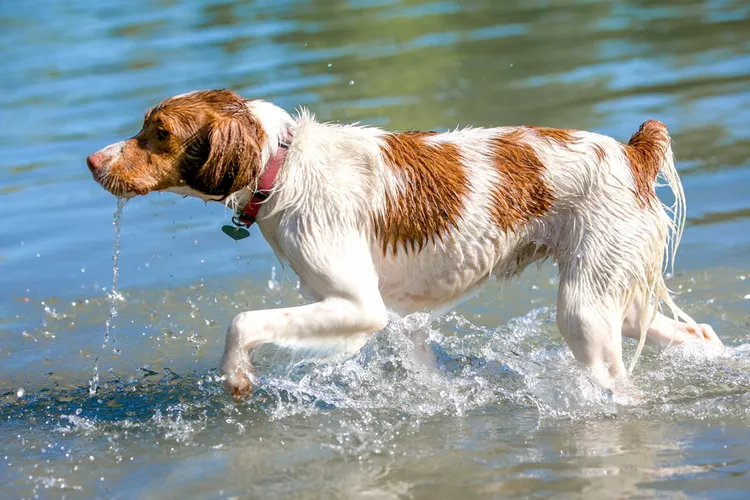
Understanding the behavior of Brittany dogs is essential for owners and those considering bringing one into their home. These dogs blend instincts, personality, and learning ability, which affects how well they fit into different houses and roles.
Brittany dogs have a strong instinct to chase, which shapes how they interact with other animals and their training process. They are also known for being great with active families due to their friendly disposition.
Moreover, these dogs are intelligent and keen to please, which makes them responsive to training and capable of learning quickly.
High Prey Drive
Brittany dogs are known for their strong desire to chase and fetch, which is part of their nature. Owners should ensure these active dogs get plenty of exercise daily to channel their instinct to track into something positive. These dogs require at least an hour of vigorous exercise to prevent behavioral issues that may arise from their unused energy and natural hunting skills.
Families that love to be active are ideal for Brittanys because they can provide the regular exercise and mental challenges these dogs need. A consistent routine with physical activities, including dog sports, advanced training, or guided hunting, can turn Brittany’s strong prey drive into beneficial behavior.
Family-Friendly Nature
Brittany dogs are known for their friendly nature and gentle and eager temperament to make their families happy. They fit into a home, offering affection and a zest for play and shared activities.
A Brittany is an excellent option for those looking to adopt a dog that’s easy to train and keen on building close ties with its owners. They respond well to positive training methods and thrive in active settings that provide regular interaction and exercise, vital for their overall health and happiness.
With proper socialization, these dogs also get along wonderfully with kids and other animals, making them perfect pets for a lively household.
Energetic Behavior
Brittany dogs are known for their friendly nature and remarkable energy levels. They need an hour of intense daily activity to stay happy and healthy. This breed thrives on exercise that tests their physical and mental strength.
Without enough activity, Brittany may start showing signs of restlessness and might bark more than usual. To prevent this, it’s wise to have a varied exercise plan to engage their body and mind. This approach helps maintain their calm behavior and makes them more manageable.
Training Responsiveness
Brittany dogs are known for their quick learning and desire to please, making them stars in training.
Their natural tendency towards obedience shines through when they start socializing early, which is vital for developing their ability to interact and adapt.
Regular physical activity is critical, as it keeps them fit and sharpens their minds, making them more receptive to learning.
Positive reinforcement is an intelligent way to keep their attention and promote good behavior.
Brittany’s training success comes from their inherent qualities, supported by consistent exercise and intelligent training methods.
These elements must be carefully balanced to help them become obedient and attentive pets.
Socialization Needs
Socialization is critical for Brittanys to become well-behaved and confident dogs. Exposing them to different places, people, and animals early on helps them grow into friendly and well-mannered adults.
Without proper socialization, Brittanys may become nervous and less able to cope with new situations, leading to behavior issues.
Owners should prioritize regular socialization activities that complement Brittany’s strengths as a loving companion and skilled working dog.
Breed Profile: Common Health Concerns

Like all breeds, Brittany dogs have specific health issues that owners must be aware of. These concerns range from genetic conditions to those influenced by how they’re cared for and their living environment.
Hip dysplasia is one such condition that can seriously affect Brittany’s ability to move and enjoy life. Owners should also proactively prevent ear infections, which are familiar in Brittanys because of their floppy ears.
Good breeding practices are also vital, significantly affecting these dogs’ overall health and lifespan.
Hip Dysplasia Incidence
Hip dysplasia is a common health issue in Brittany dogs that can severely affect their ability to move and overall well-being. It’s a genetic problem where the hip joint doesn’t form properly, leading to discomfort, arthritis, and difficulty walking.
Breeders and dog owners need to work together to reduce the chances of this condition by choosing healthy breeding pairs and managing the dogs’ activities. The Orthopedic Foundation for Animals (OFA) is a crucial resource that tracks the health of Brittanys and offers evaluations breeders should not overlook. Strict health screening can help decrease the spread of this painful condition.
If you’re considering getting a Brittany dog, check for health clearances to help your pet lead a long and healthy life and maintain the breed’s good genetic health.
Ear Infection Prevention
Ear care is vital for keeping infections at bay, especially for Brittany dogs, which are prone to these issues. Owners should regularly examine their Brittany’s ears for any signs of trouble, such as redness or discomfort, which could suggest the beginning of an infection.
Dog owners should use an approved ear cleaner to clean their ears and gently remove debris or build-up. After swimming or bathing, it’s essential to dry their ears completely to prevent any moisture-based infections.
It’s also necessary to give Brittanys plenty of exercise without neglecting their ear health, watching out for excess wax build-up or foreign bodies that could lead to problems.
Lifespan and Genetics
A Brittany dog can live between 12 and 14 years. However, their health can be affected by inherited conditions like hip dysplasia, epilepsy, and hypothyroidism.
These dogs are typically vigorous and benefit greatly from regular physical activity, which boosts their physical and mental health.
To ensure a long and healthy life for a Brittany, it’s vital for owners to keep up with veterinary check-ups and to choose breeders who provide health clearances for common genetic issues.
Steering clear of inbreeding can also help decrease the chance of genetic diseases.
Owners should be aware of these factors to support their Brittany’s well-being.
Maintenance Requirements
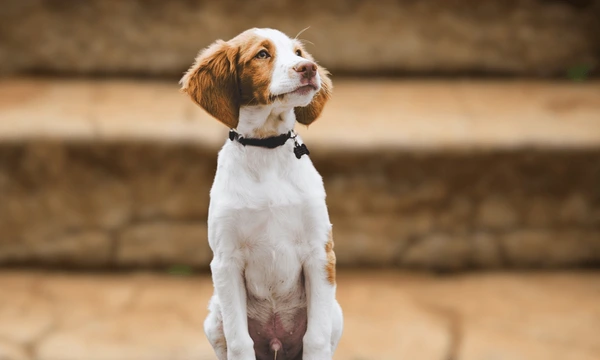
Brittany Dogs require attentive care to keep them healthy and content. A regular grooming routine, including brushing and checking their ears and nails, is critical to avoiding discomfort and potential health problems.
They need plenty of exercise daily to keep Brittany’s energy in check and prevent behavior issues. Their diet should be rich and tailored to meet their energy levels, ensuring they stay in peak condition.
Understanding these care essentials will help Brittany owners provide their pets with a loving and supportive home.
Grooming Frequency
Regular brushing, at least once a week, is vital for a Brittany dog to keep its coat in top condition and reduce excess hair in your home. The breed’s dense coat, which can be flat or slightly wavy, is known for its striking color patterns, such as orange and white, liver and white, or black and white.
A good brush cuts down on shedding and prevents the fur from matting, which is essential for a breed as active and graceful as the Brittany. Pay special attention to the neck, ears, and legs, as these areas might need extra care to keep the dog looking tidy.
If your Brittany has a roan pattern with distinct ticking, handle the coat carefully to keep its particular design looking its best.
Exercise Regimen
Brittany Spaniels are lively dogs that thrive with a regular exercise schedule to meet their activity and brain engagement needs. They have a lot of energy and like a good physical and mental challenge. Dog owners should give these pets at least 40 minutes of intense exercise daily to keep them healthy and well-behaved. Neglecting their exercise needs can result in unwanted behaviors, highlighting the need for a steady and vigorous routine.
A good exercise plan for Brittany includes plenty of movement and brain games. Take them for extended walks or runs, and ensure they have a safe space to play. It’s also wise to mix in activities that stimulate their minds, like training exercises or interactive toys, to keep them sharp and content.
Diet Considerations
Proper nutrition plays a pivotal role in the health and vitality of Brittanys, necessitating a diet that aligns with their energetic lifestyle. Active dogs require a diet rich in protein to sustain their vigor. High-quality dog food that caters to their specific caloric and nutritional needs is essential.
Feeding Brittanys the right food in the correct amounts is critical to maintaining their lean muscle mass while preventing obesity, a common concern given their propensity for vigorous activity. Adult Brittanys should be fed two meals daily to support sustained energy levels throughout their active periods. Careful monitoring of their intake and weight is paramount.
Ensuring a balance between caloric input and output through regular exercise will contribute to their overall well-being and prevent behavioral issues linked to under-stimulation, both physical and mental.
Health Check-Ups
Ensure your Brittany dog visits the vet regularly to stay healthy and catch any potential health issues early on. These dogs typically live 12-14 years and are generally hardy, but keeping an eye on their health is critical.
Tailored health surveys can help identify breed-specific conditions, allowing owners and vets to focus on preventive care. A well-rounded health plan includes regular exercise, a balanced diet, and proper grooming to prevent obesity and other health problems.
Connecting with groups like Brittany Rescue can offer insights into the health backgrounds of dogs up for adoption, aiding in making well-informed choices and contributing to the overall welfare of the breed.
Training Commitment
Training a Brittany dog requires consistent training and positive reinforcement to shape their behavior and ensure they grow into well-behaved pets. Training early is vital to establish a good foundation for Brittany’s future behavior.
Analyzing the training needs of a Brittany shows they respond best to regular, thoughtful interactions. These energetic and intelligent dogs need mental stimulation regularly; they may develop unwanted behaviors without it. Brittanys excel when their training sessions are engaging and challenging, tapping into their desire to please their owners.
Therefore, sticking to a structured and regular training schedule is crucial for keeping their temperament in check and preventing behavior problems.
Dietary Needs
Brittany dogs have specific dietary needs vital for their health and energy levels. It’s necessary to consider a few key elements when planning their meals:
- A well-balanced mix of proteins, fats, and carbohydrates is essential to keep up with Brittany’s active lifestyle.
- They should eat at consistent times to meet their digestive and energy needs.
- It’s also important to watch for food sensitivities to keep them in top condition.
Keeping these factors in mind helps your Brittany dog stay at a healthy weight and ensures they’re getting the proper nutrients.
Nutritional Requirements
Nutritional Needs of Brittany Dogs
Brittany dogs are known for their boundless energy and require a diet that keeps them fit and healthy. These active dogs do well on about 1.5 to 2 cups of high-quality dry food split into two meals daily. Adjust the amount of food based on how busy your Brittany is; a dog that spends more time running and playing might need extra food to maintain its energy.
Regular vet check-ups are crucial to catch and manage health issues common to the breed, such as hip dysplasia, epilepsy, and hypothyroidism. Selecting a diet that supports Brittany’s health and high activity levels is vital while avoiding overfeeding and the risk of obesity.
Feeding Frequency
When setting up a feeding schedule for Brittany, it’s essential to balance their meals with their activity levels and age to avoid health issues like obesity or malnutrition.
For Brittanys that are full of energy and often on the move, a diet with more calories is necessary to keep them going. On the other hand, dogs that spend most of their time indoors may need less to eat to prevent unnecessary weight gain.
Feeding them consistently is a good practice to maintain a constant energy supply.
Regularly monitoring your dog’s weight and adjusting their food intake is vital to keeping your Brittany in top shape and full of life.
Food Allergies Management
Managing food allergies in Brittanys requires creating a special diet to prevent reactions and keep them healthy. Determining which foods cause allergies involves an elimination diet and tests from the vet.
Once you know what foods to avoid, you can choose hypoallergenic or limited-ingredient foods to lower the chance of an allergic reaction. It’s crucial to watch how your dog reacts to the new diet and to keep up with regular vet visits.
A balanced diet is essential, so make sure your Brittany gets all the necessary nutrients without the allergens. This careful approach helps keep your Brittany in top health.
